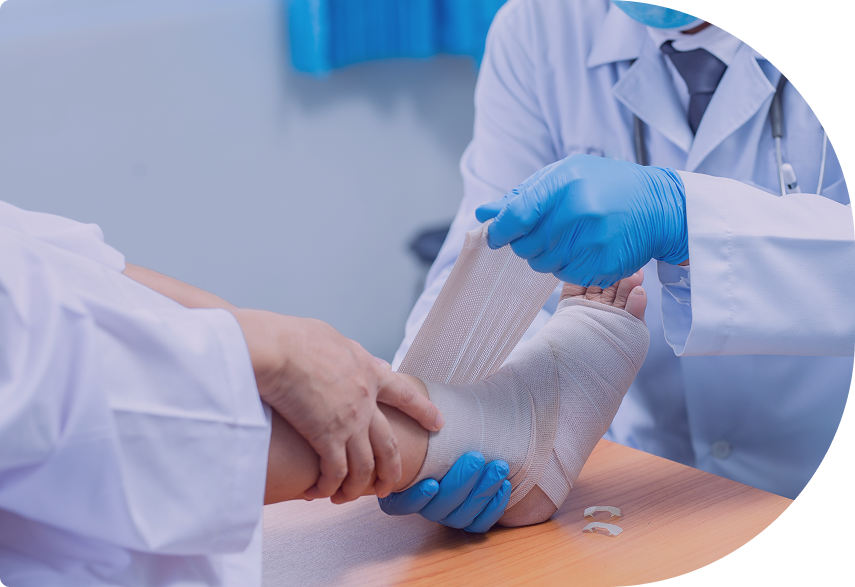Best Medical Billing Services for Wound Care Clinics and Providers
Let our professional wound care billers manage the business side of your medical practice for maximum reimbursement and fewer claim denials. Our exceptionally good wound care billing services consolidate your financial health, enabling transparency to improve outcomes.

Billing and Coding Experts in New Hampshire
Our wound care billing solutions are carefully designed to meet rising challenges of the intricate billing process pertaining to wound care procedures and treatment. We understand the burden of medical care is huge and not getting paid damages your earnings. To keep your clinical practices thrive in New Hampshire, we offer our state-of-the-art injury care billing solutions that assist your facility in streamlining and bringing automation into the entire revenue cycle management process.
At New Hampshire medical billing company, we offer exceptional 24/7 support to help you get paid on time, and submit error-free claims. Choosing our wound care coding and billing professionals increase your collections without any trouble and delay.
Our RCM/Billing and Coding services for Medical Practices
Insurance Eligibility Verification
Injury care billing services staff of our company performs comprehensive insurance eligibility verifications to ensure medical care provided to patients is covered under their health plan.
Prior Authorization Management
To justify medical necessity, we obtain prior authorization from insurance companies to help expedite medical claims and fasten the collection process to strengthen financial health.
Wound Care Coding Services
Our team is conversant in latest CPT coding for wound assessments, debridement, dressing changes and ICD-10 coding for wound diagnoses like pressure & diabetic ulcers), use of appropriate modifiers (59, 25, 76).
Wound Care Claims Submission
After adding appropriate billing codes for injury and skin issues, our medical billing experts submit the wound care claims to specific insurance payers in a timely manner.
Payment Posting
To improve transparency in revenue cycle management, our RCM staff pays great attention to detail and reconciles claim amounts with medical services to ensure providers are paid in full.
Denial Management and Appeals
AI-powered denial management solutions offered by our company to New Hampshire providers reduces the number of denials by 70% with quick filing of appeals on financial inconsistencies.
Accounts Receivable (AR) Management
Our medical billing services ensure wound care practices in New Hampshire have zero past due backlogs and all claims are reimbursed without any unfair deductions.
Provider Credentialing & Contracting
We offer our assistance to wound care physicians and practitioners in getting their practice’s profile credentialed and enrolled with best insurance payers on favorable terms.

Specialized Service Billing
- Debridement billing (selecting correct depth and extent).
- Skin substitute graft billing (applying correct Q-codes and site-specific documentation).
- Negative Pressure Wound Therapy (NPWT) billing (e.g., billing for durable medical equipment vs. facility services).
- Hyperbaric Oxygen Therapy (HBOT) billing (proper authorization, medical necessity documentation).
Common Challenges of Wound Care Billing
Problems in Documentation
Improper clinical documentation causes majority of claim denials resulting in erroneous billing and consequently claim rejection or denial.
Inaccurate Coding
Lack of knowledge about the latest ICD-10, CPT and HCPCS coding may cause improper use of wound care code and modifiers.
Insurance Verification Difficulties
Failure to do complete insurance verification checks results in denial due to medical care not covered under the health plan.
Challenges in Modifier Usage
Inability to understand the nuances of wound care modifiers can lead to upcoding or downcoding resulting in invalid claims.
Our Wound Care Billing Process
Documentation Requirements
The first step we take is ensuring a spotless documentation process that includes specific wound measurements, characteristics, treatment details, wound location, depth, tissue type, drainage, and signs of infection. By taking this step, we accelerate the reimbursement process.
Treatment Code Verification
Our AHIMA and AAPC-certified wound coders are experts in coding all procedures pertaining to injury care treatments and procedures including debridement procedures, negative pressure therapy, and skin substitute applications. Our coding specialists stay updated with the latest ICD-10, CPT and HCPCS coding standards.
Payment Processing Steps
We take calculated steps to make your revenue cycle process faster and seamless by ensuring comprehensive insurance verification checks, prior authorizations, timely claim submission, follow-up on ARs, addressing any claim denial and filing appeal to resolve any rising issue.
Why Choose New Hampshire Wound Billing Solutions?
- Accurate charge capture for all wound care services
- Proper coding for advanced treatments and supplies
- Insurance verification and pre-authorization
- Claims submission and tracking
- Payment posting and reconciliation
- Detailed financial reporting and analysis
- Denial management and appeals
- 24/7 Patient billing support
- Detailed review of all wound care documentation
- Expert coding for all treatment types and modalities
- Regular claim status monitoring and follow-up
- Swift resolution of any payment delays or denial

Choose Us As Your Wound Care Billing Partner
in New Hampshire
Call :Book Now
Frequently Asked Questions (FAQ)
How do you bill for wound care?
Wound treatment is commonly invoiced using CPT codes such as debridement, open wound examination, topical therapy, and whirlpool. A fee may be levied for every additional 20 square centimeters of debridement.
What is the CPT code for wound care visit?
The CPT code for a wound care visit is 97597, which includes debridement, open wound care with topical treatments, wound assessment, and whirlpool treatment. Additionally, 97598 is applied for each extra 20 square centimeters of waste.
Can you bill 97597 and 97605 together?
You should bill 97597 (RVU: 0.89) separately because it has a greater RVU than 97605 (RVU: 0.72). Unbundling these two codes may be accomplished with an appropriate modifier, but only if it is warranted.
What is required for CMS wound documentation?
To ensure adequate CMS wound management, the patient’s medical record must include evidence of wound progress from each physician visit, such as current wound volume, signs of infection, and the presence or absence of necrotic or non-viable tissue.
What are the main challenges in wound care billing?
Wound care billing has several problems, including compliance with complex rules, precise coding, and detailed documentation, etc.